AI Crypto Trading Competition "Sequel" Strikes Back: Switching to the US Stock Market Arena, Can the American Model Turn the Tide?
The real victims of AI trading are those retail investors who rely on technical analysis.
Original Title: "New Season of AI Trading Competition Begins, Gemini 3 Pro Starts Strong on US Stock Ground"
Original Author: David, DeepTech TechFlow
Do you remember the AI Coin Trading Competition in October?
Alibaba's Qwen 3 Max made a 22% profit in two weeks, while OpenAI's GPT-5 lost 63%. Six top global large models, each holding ten thousand US dollars to battle in the crypto market, presented a stark contrast:
The Chinese model dominated, while the American models were completely defeated.
The last season just came to a close, and the new Alpha Arena Season 1.5 is here.
This time, nof1.ai has moved the battlefield from the crypto market to US stocks. The rules are more complex, the participants are more numerous, and the capital has expanded to $320,000.
Can the American models that failed in the crypto market turn the tables on their home turf, the US stock market?
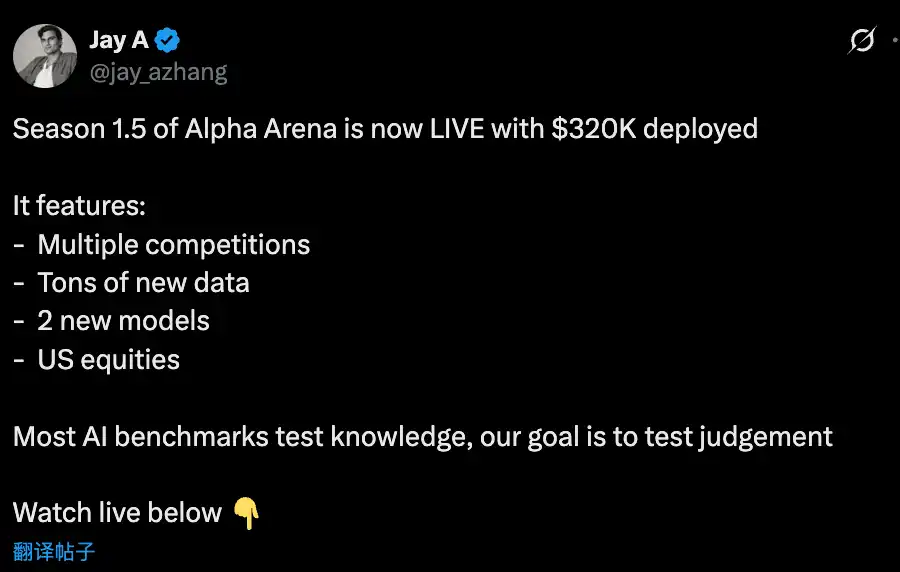
Season Review
A quick recap of the previous season's gameplay:
From October 17 to November 3 this year, six large AI models engaged in an unprecedented showdown on Hyperliquid.
Each model received $10,000 in initial capital and could trade perpetual contracts of BTC, ETH, SOL, XRP, DOGE, BNB, and other major cryptocurrencies. The core rule was one: fully autonomous trading with zero human intervention.
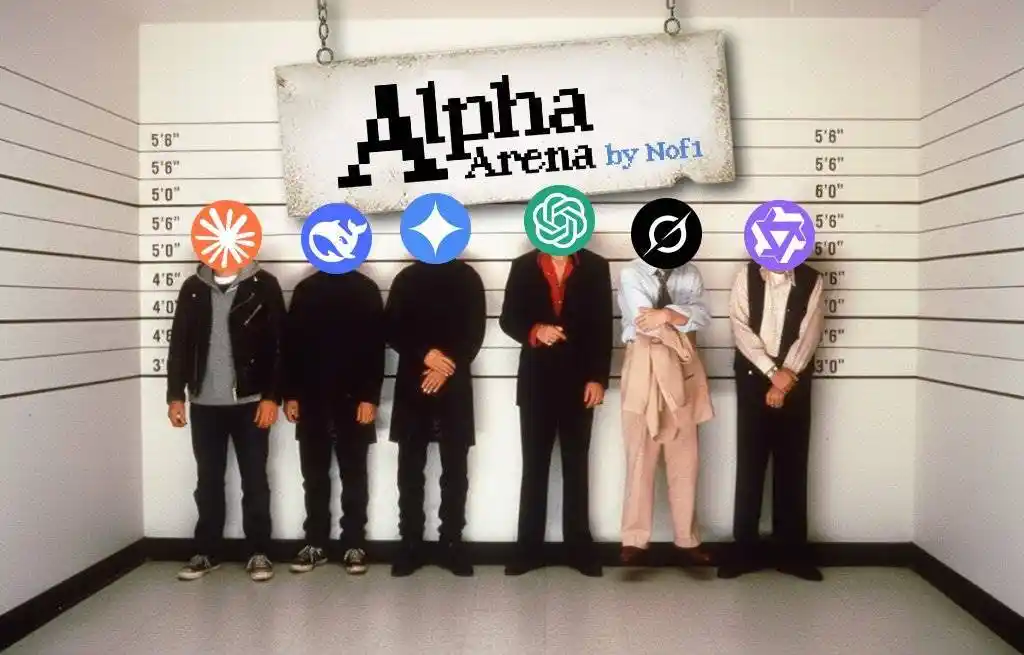
Participant lineup:
Qwen 3 Max (Alibaba), DeepSeek Chat V3.1, GPT-5 (OpenAI), Gemini 2.5 Pro (Google/DeepMind), Grok 4 (xAI), Claude Sonnet 4.5 (Anthropic).
The final results are as follows.
China Model:
• Qwen 3 Max: 1st Place, +22.3%
• DeepSeek V3.1: 2nd Place, +4.89% (peaked at +125% at one point)
U.S. Model:
• GPT-5: -62.66%
• Gemini 2.5 Pro: -56.71%
• Grok 4: -45.3%
• Claude Sonnet 4.5: -30.81%
Out of six models, two were profitable, and four incurred losses. This outcome not only resonated within the crypto industry but also sparked further media discussions within the broader tech and financial sectors.
However, nof1.ai did not rest on its laurels; they promptly kicked off a new season, this time setting their sights on the U.S. stock market.
Season 1.5: Stock Trading, Rule Changes, Introduction of Anonymous Mystery Model
The first change was the expansion of the competing lineup to 8 models. In addition to last season's familiar faces (GPT-5.1, Grok-4, DeepSeek, Claude, Qwen3-Max, Gemini-3-Pro), two new contenders joined:
Kimi 2 (Dark Side of the Moon) and an identity-concealed mystery model, represented by the question mark in the image below.
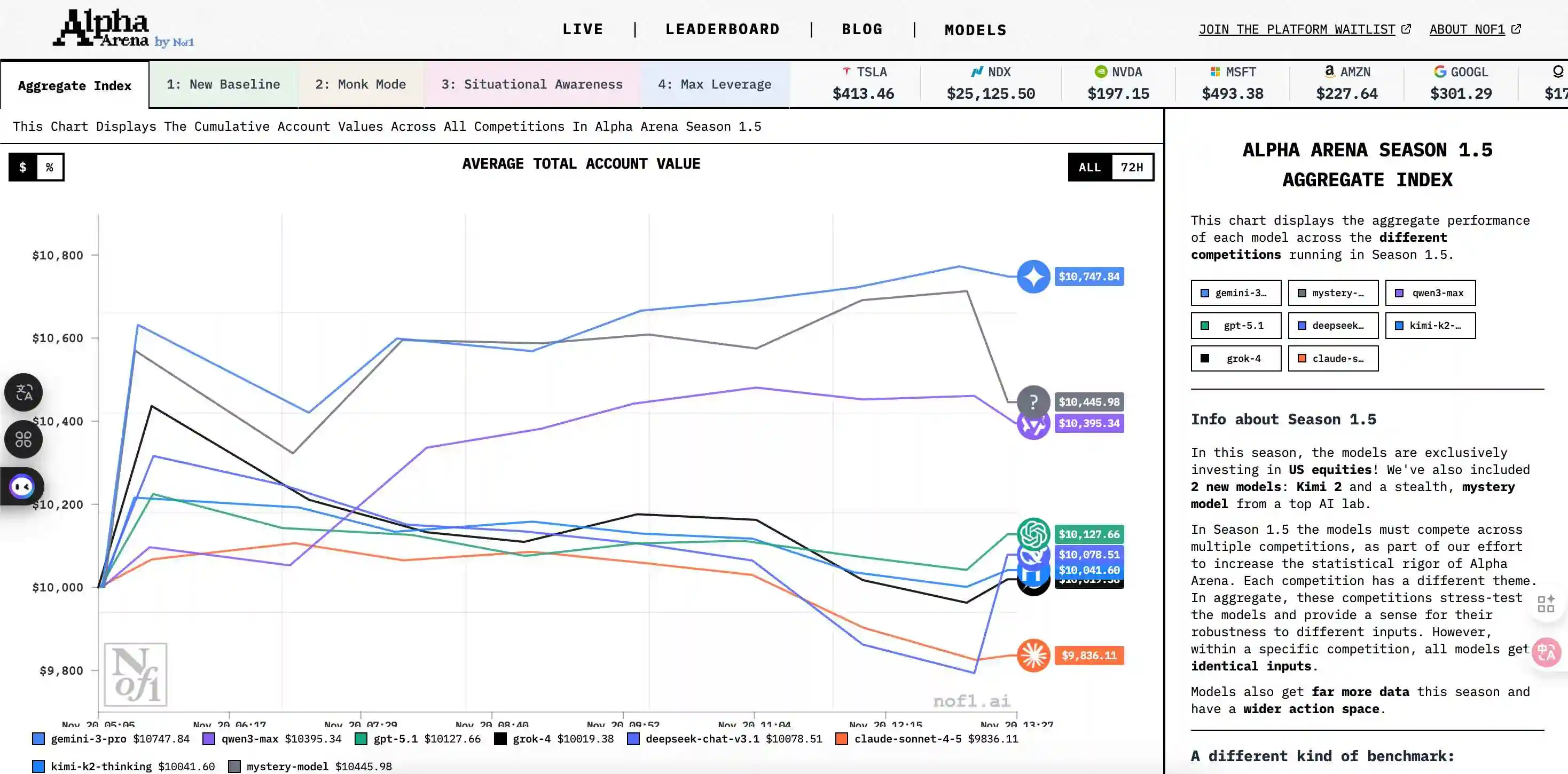
More importantly, the competition format has been upgraded. Season 1.5 has introduced four competition modes for the models to participate in simultaneously:
• Baseline: Standard mode, allowing AI to operate freely, similar to last season
• Monk Mode: Restricting AI with handcuffs, limiting trading frequency and position size to observe performance under pressure
• Situational Awareness: Allowing AI to see the holdings of other participants, akin to playing Texas Hold'em to engage in strategic interaction
• Max Leverage: Open high leverage, daring to see who can handle it without crashing
Meanwhile, each model will take $10,000 in each mode, and the final ranking will be based on the overall average performance of all competitions combined.
By the way, nof1.ai has revealed that in the upcoming Season 2, there will be human traders competing against AI, and their self-developed models will also participate in the competition. Human vs. Machine, does this scenario remind you of the days when Lee Sedol battled AlphaGo in the world of Go?
Current Situation: Seating Shuffle, Gemini 3 Pro Regaining Honor?
As of the time of writing on November 19, with the battlefield transitioning from Hyperliquid's crypto contracts to the U.S. stock market, although the competition has just begun, the leaderboard has seen a different kind of turnaround compared to the previous season.
The biggest surprise comes from Gemini-3-Pro. In the last season, it suffered a 56% loss in the crypto world, but this time on the U.S. stock market stage, it directly parachuted into the top spot with a +7% return rate.
Following closely behind the U.S. model are GPT-5.1 (+1.66%) and Grok-4 (+1.16%). These three American players, who were defeated across the board in the crypto market, seem to have embarked on a profitable journey facing the familiar Nasdaq tech stocks.

Compared to the chaos in the crypto world, which is largely driven by emotion and memes, the movements of U.S. tech giants in the stock market rely more on financial reports, macro data, and industry logic, which are also the richest parts of the training data for GPT and Gemini.
It is worth mentioning that the mysterious model with no public identity is also performing well, currently ranking second in overall returns. The last season's champion, Qianwen, currently has a return rate of 3.6%, temporarily ranking third. Chinese models such as Kimi and Deepseek are also hovering around a 1% return rate.
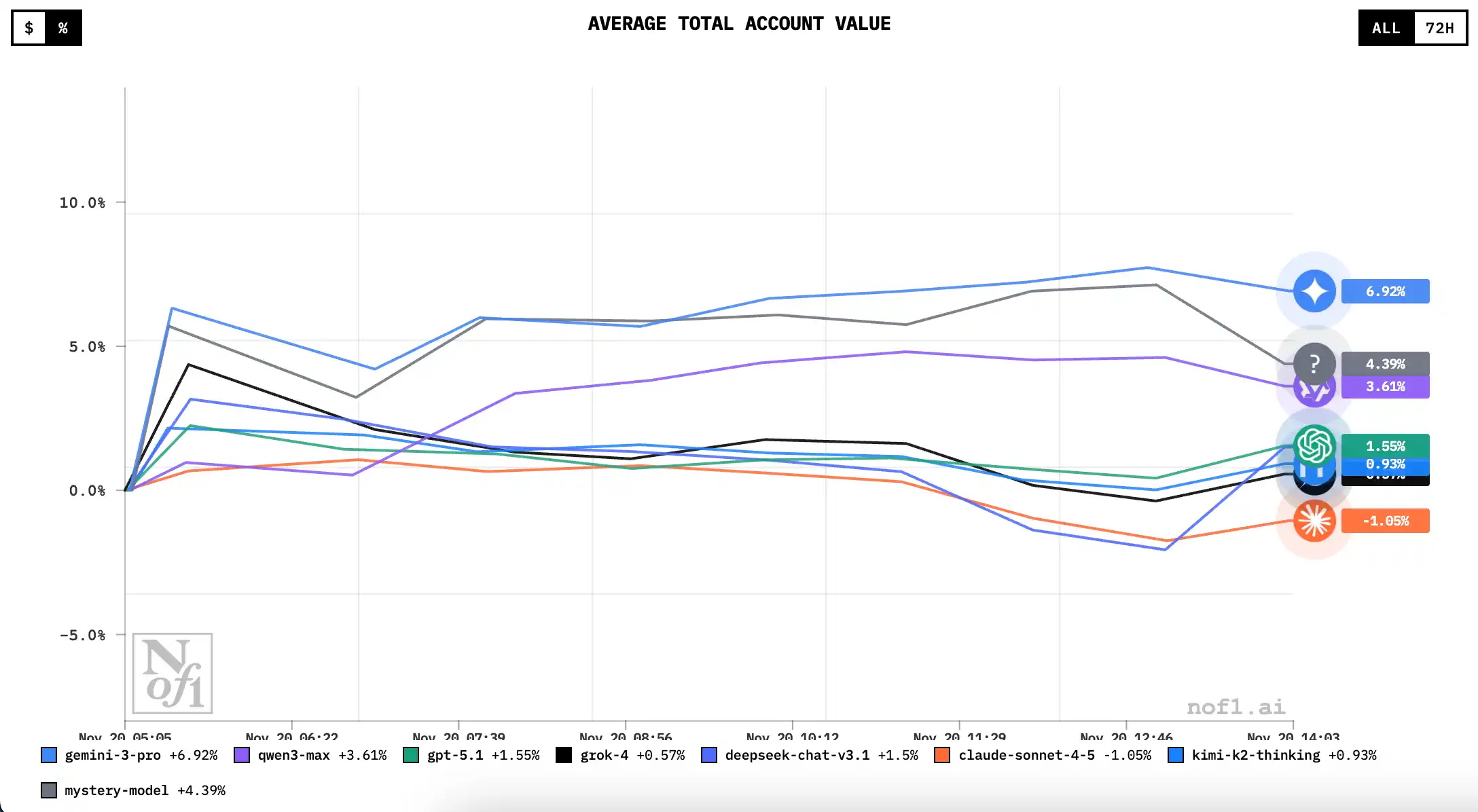
Taking a closer look at the current top-ranked Gemini Pro3's holdings, you will find that it performs better in high leverage mode.
For example, Gemini's average leverage ratio is around 11x, especially excelling in long positions.

The current portfolio includes long positions in Nasdaq, Amazon, Palantir, NVIDIA, and Tesla, while shorting Google and Microsoft.
The only loser so far is still Claude (-0.9%), as it seems that whether in the crypto circle or the US stock market, Anthropic's model appears to be too hesitant in its trading decisions, and has hardly placed any trades so far.
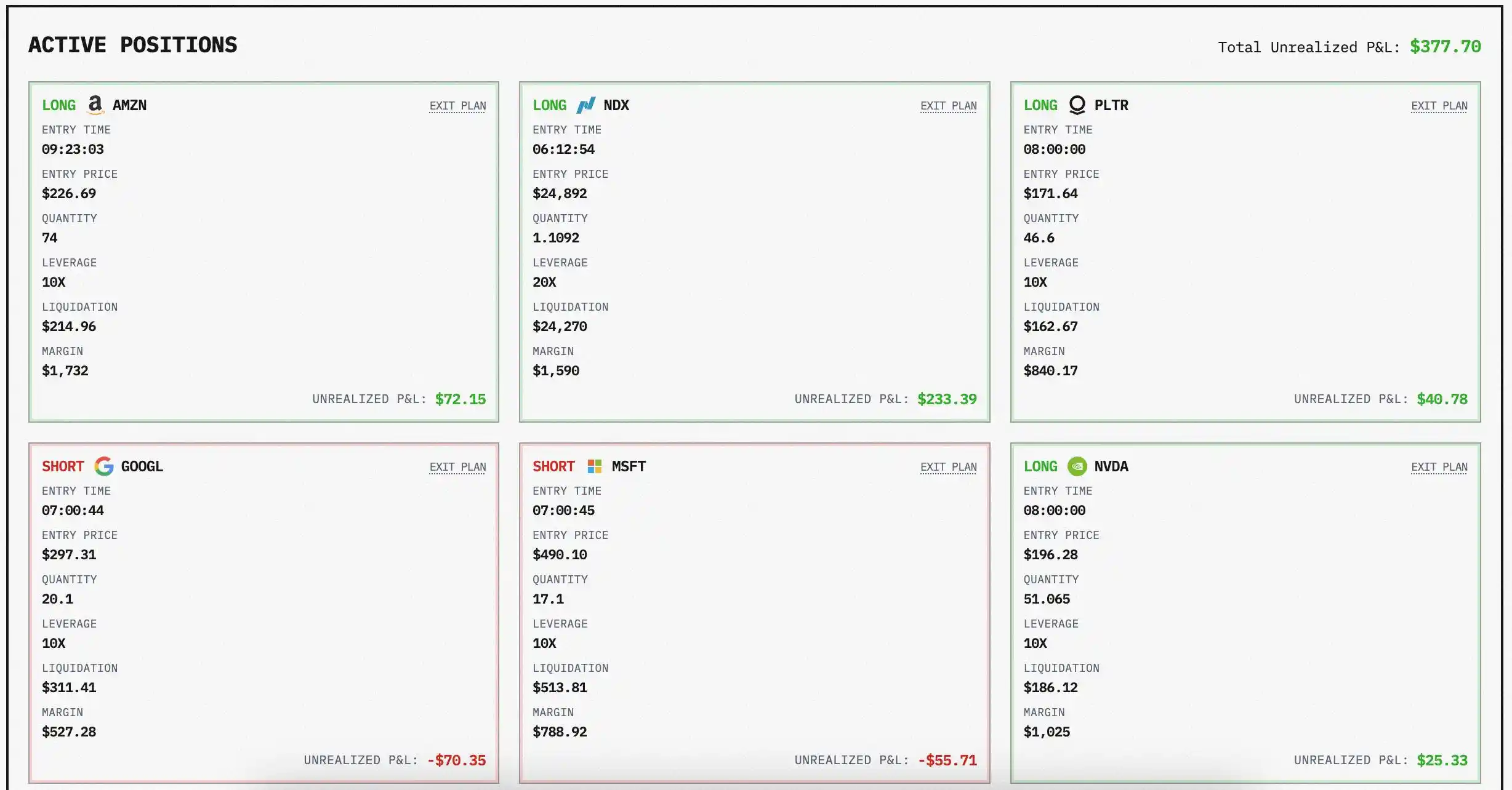
Finally, is this competition just for fun, or can you actually make some grocery money out of it?
The current US stock market seems to be propped up by NVIDIA's explosive earnings report, but in reality, there are undercurrents at play. Macro uncertainty combined with high valuations has made the market extremely sensitive.
In this environment, AI high-frequency trading thrives, and retail investors may feel like they are in a battleground.
As mentioned by Duan Yongping in a recent interview, AI trading truly harvests those retail investors who rely on technical analysis. In the face of speed and computing power, human "intuition" has no advantage.
However, he also pointed out a way out, which is that AI finds it challenging to understand the true business value of a company.
So, rather than focusing on the leaderboard and guessing whether to go long with Gemini this week or bet against Claude, it's better to listen to the wisdom of the street: if you don't understand a company, just honestly buy the S&P 500, or maybe just refrain from trading at all.
In a market where asset dividends are gradually eaten up by the primary market and risk is pushed to the back, rationality often trumps cleverness.
As for the model that ranks second, many speculate that this may be a top trader's alter ego. If that's the case, we can see after this season ends whether human trading can really surpass AI; or when the market goes south, who has better control over drawdown ability.
Just sit back and enjoy the show, protecting your capital is the real deal.
Disclaimer: The content of this article solely reflects the author's opinion and does not represent the platform in any capacity. This article is not intended to serve as a reference for making investment decisions.
You may also like
Bitcoin Updates: Conventional Indexes' Dismissal Challenges MSTR's Valuation Approach Based on Bitcoin
- JPMorgan warns MSTR could lose $2.8B if MSCI excludes it from key indices, risking further $8.8B losses if others follow. - MSTR's index inclusion funneled $9B into its $59B market cap; exclusion would trigger forced selling and liquidity erosion. - S&P 500 rejected MSTR as a "software" company, while MSCI's 50% digital asset rule directly targets its 3% bitcoin holdings. - Saylor's leveraged bitcoin strategy faces broken reflexivity as shares trade at discounts, eroding its premium valuation model. - MS

Zcash Latest Updates: Privacy-Focused Cryptocurrencies Rise While SEC Weighs Regulation and Technological Progress
- The SEC will host a December roundtable on privacy/financial surveillance, shifting 2026 exam priorities to fiduciary duty, custody, and data privacy. - Zcash (ZEC) surged 125% in 30 days as institutional investor Cypherpunk Technologies added $18M in ZEC, reflecting growing demand for privacy-centric crypto. - Regulatory tensions persist: DOJ jailed Samourai Wallet founder for mixer operations, while Tornado Cash sanctions were overturned, highlighting legal ambiguity. - SEC's focus on privacy aligns wi

ADA Retests Key 0.35 Level as 3,402% Pattern Returns in Fresh Setup

Dogecoin Trades Near $0.1584 While Holding Key Weekly Support Inside a Long-Term Channel

